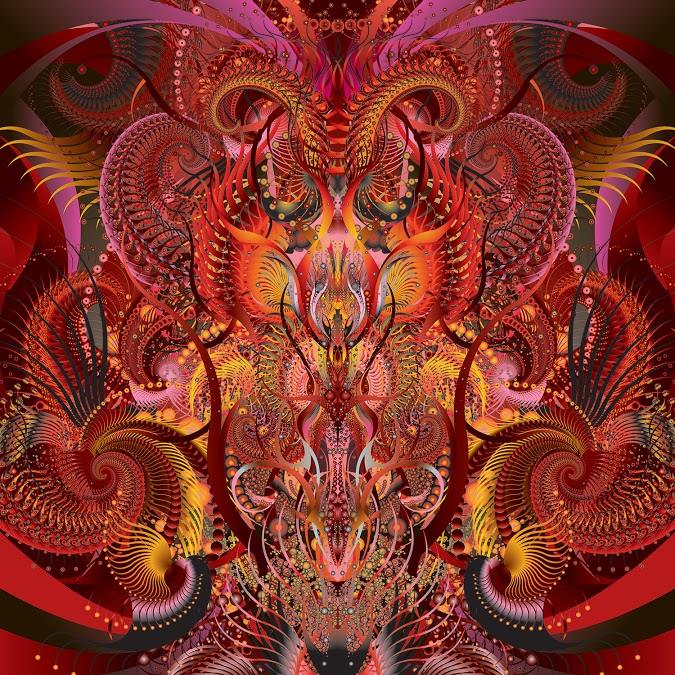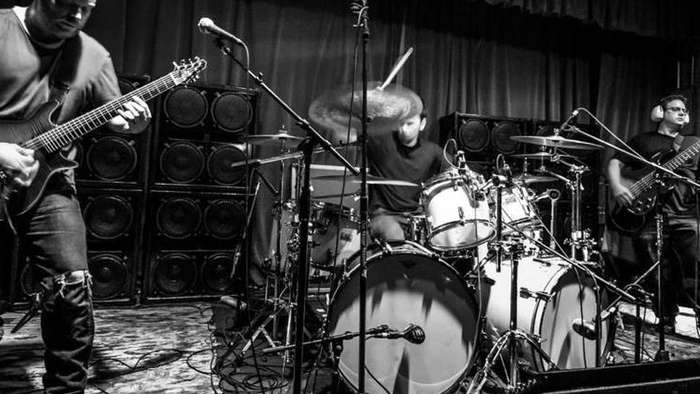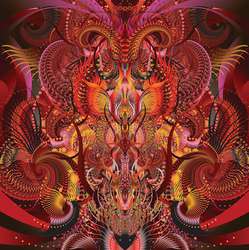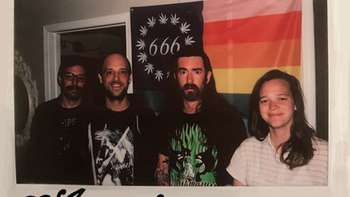Blind Idiot God have been one of the iconic extreme experimental bands since their inception back in the '80s. Their career was taking off with their three albums, the self-titled debut, Undertow and Cyclotron. However it still has been quite a bumpy ride as Andy Hawkins, guitarist of BIG, explains in this interview. Andy sheds light in what occurred in the time between the release of Cyclotron and their newest album Before Ever After, as well as describing the impact the new members had on the band, the importance of working with people that know your music, the state of the music industry today, and some of the future plans that he has for the band, as well as some other projects.
Scene Point Blank: Hey Andy. Firstly, thanks for finding the time to do this interview, it is much appreciated!
It has been a while since Cyclotron was released. It has been a bit unclear as to what you guys have been in the years in between. Could you elaborate?
Andy Hawkins: Yes, things can get a little hazy when you are wandering in the desert... After Ted Epstein quit in '96, I went to Los Angeles to scout out the possibility of moving the band there in order to economize on living/rehearsing expenses. I was also looking for a drummer, with bassist Gabe Katz to join me if I was successful. I was not--couldn't find any drummers to play with--despite months of ads and our records still regularly being played on the radio. The only guy who answered the add played drums in a performance art group whose material was based on the beheadings of the French Revolution. I love the food, the weather and all the proximity to nature, but otherwise, LA sure seemed like a really lame, rootless place.
Then, to in order to have the complete LA experience, I got hit on my motorcycle by a drunk Mexican guy. With my bike totaled, I had to decide whether to stay, buy a car and commit to living there, or go back to NYC. Gabe and all my friends wanted me to come back, so I did.
I knew it would probably take a while to find another drummer and a rehearsal space where we could rehearse at full volume, so I started working on some quieter material I had been playing off and on for a long time, all open tuning clean sound guitar stuff. I started off working with Henry Bogdan from Helmet on lap steel and Gabe on 5-string fretted and fretless, no drums. Henry got too busy and we got another lap steel player, then finally Gerald Menke on pedal steel and it became a band called Downriver. By that time I had found Tim Wiskyda through a friend, moved into Martin Bisi's studio and BIG started rehearsing again in 2000, as well as Downriver, in which Tim also plays.
But Gabe developed hand/tendon problems, then his tinnitus came back strong and we had to sit out for months at a time while he tried various remedies. Frankly, looking back, it's amazing we were able to get through all that and actually got the record started. And of course then I ran out of money and didn't want to half ass it, so I had to raise more money and eventually we finished it. Then, because the music business had changed so much during those years, it became clear that the best way to get it out was for me to start a label and do it myself, as everybody else seems to do these days. And then I had to raise the money for that, which took a bunch more time...
"I think it would be hard for an 18-20 year old who wants to start a band now to imagine how difficult and forbidding it was back in the early '80s to try and find an audience with instrumental music."
Scene Point Blank: Do you think that abstaining for near twenty years from releasing albums changed your perspective on the music of Blind Idiot God?
Andy Hawkins: Well, it certainly is interesting to see how much has changed and how many and how narrow all the subcultures are that have branched off the roots of the first few musically ambitious, heavy bands. I think it would be hard for an 18-20 year old who wants to start a band now to imagine how difficult and forbidding it was back in the early '80s to try and find an audience with instrumental music. When we first toured in Europe, even Germans would tell us we needed a singer and that our music was too cold and unemotional! Now there's a new tech metal band from every country, every week that I've never heard of. The sheer number of bands out there now is hard to comprehend, perhaps even more hard to comprehend is how similar so many of them sound.

Scene Point Blank: Do you make any comparisons between your early days and first three albums and Before Ever After? What would you say has been the evolution of the band throughout the years?
Andy Hawkins: When Tim joined the band, right away I knew we were going to be approaching things differently. He is much more of a flow drummer, meaning he fills up space in a different way; he likes to constantly, subtly change things, in ways that you sometimes barely notice. This created an opportunity to loosen up structures and, of course, loosen up the ideas behind the music as well. Ted was a very dense player most of the time, to point that the music was almost bursting at the seems, which was certainly what we were going for. I think with Tim, the music ebbs and flows in a way that is very fluid, which then opened up a whole new set of possibilities.
Scene Point Blank: You collaborated once again with Bill Laswell. How would you describe your relationship and what is his influence on your music?
Andy Hawkins: Bill is a fellow traveler, a true pioneer of the bass, a musical mind that knows no bounds and a great friend to the band. It is always inspirational to see how easily he traverses so many territories. He is the closest thing I've had to a mentor and one of the only people I've met who shares a similar multi-genre approach to music. We both see connections between musics and try to bring those connections into that nexus where time stands still, as only music can accomplish.
Scene Point Blank: You also used Robert Musso as an engineer for Before Ever After, and you had previously worked with him on Cyclotron. How important is it for you to work with people such as Laswell and Musso, who know your sound and understand what you are trying to do?
Andy Hawkins: Very. In my opinion, people work best together when everybody has an implicit understanding of purpose and goals. That kind of thing can only come from like minds and similar experiences. And when you have that between everybody things move fast, far, and in the right direction. Music is already hard to talk about, even amongst musicians, except in the most clinical terms, terms which usually have little or nothing to do with what makes music great in the first place. Which is exactly why I dropped out of music school.

Scene Point Blank: This is the first album that you did not work with Martin Bisi, someone you worked with in your three first albums. What signalled that change?
Andy Hawkins: Bill had his own studio, a steady staff and that studio was/is far away from Brooklyn, in New Jersey. Martin also had been moving away from engineering and on to his own musical ambitions and doesn't really like working outside his own studio anyway. So that was that. Martin is still one of the best engineers I've ever worked with. His ability to capture and use room ambiance is truly exceptional. I hope to work with him again someday.
"The things which make music great are difficult to describe because they are mostly things which exist outside of clock time and 3 dimensional space."
Scene Point Blank: You also had an unfortunate departure in 2012, with Gabriel Katz leaving the band due to tinnitus and hearing problems. What was the impact that his departure had on the production of the album and the band in general?
Andy Hawkins: The record was finished when he left and he was a real trooper in getting it done. But of course I had to find a new bass player if we were going to promote the album, so that was yet another hurdle to jump. Fortunately Will Dahl became available and things didn't slow down for too long.
Scene Point Blank: What was it in Dahl that made you think that he is the right person for the job, and what do you think that he brings to the table for Blind Idiot God?
Andy Hawkins: Will is a very well-rounded player with very broad musical knowledge. He's a committed musician looking for challenges and that was certainly enough to recommend him. He and Tim grew up together in Upstate NY, so in addition to being very familiar with the band, he and Tim have a long standing and good rapport. He's similar to Tim in that he likes to improvise and keep things flowing, he's also an aggressive player and really adds another dimension to the louder stuff.
Scene Point Blank: Tim Wyskida joined the band back in 2001. Musically he seems to be coming from a different background, playing with great drone acts such as Khanate, Jodis, and Khlyst. Do you find that he influences some of the music of Blind Idiot God to travel towards that domain? Do you think that Dahl will be able to influence the music in a similar way in the future?
Andy Hawkins: Tim plays very differently with BIG than his other projects, which just shows how deep his musical mind is. He certainly knows how to make use of space and how to make things count.
As mentioned above, Will has a very broad musical knowledge and the new material we have been working on is a further step in the direction of flow, improvising and looser structures. The rhythm section's role in this incarnation is only getting bigger and more assertive, which is allowing us to occupy some new vantage points.
Scene Point Blank: Speaking of that, the big question is whether you are working on any new material? I am only asking since the new album was recorded between 2008 and 2010 so that leaves some space in which you might have had time to compose more music.
Andy Hawkins: Yes, we are, always. Though it did take some time to bring Will up to speed with the existing material, and to take stock of the way everybody works together.
Scene Point Blank: You also have released Before Ever After under your own label, Indivisible. How did you come to the decision of establishing your own label? Is it likely to see work from other bands outside of Blind Idiot God?
Andy Hawkins: The decision was based on the shrinking music market and the fact that so many artists are now taking control of their own production and promotion. This is the new reality of the music business. And yes, I am open to releasing material other than the projects with which I'm directly involved. I'm investigating obtaining and releasing some older out of print music, in addition to my other projects. There will be another Azonic record beginning production in September for release late this year, featuring Tim on orchestral percussion, myself on guitar, and Bill Laswell mixing. The next record after that will probably be the Downriver LP which was recorded back in 2006.
Scene Point Blank: You also had Sheldon Hunt do the artwork for the album. How much of guidance did Hunt have from you guys for creating that amazing cover? Also, since your music does not contain vocals, do you find it more difficult to visualize aspects of it that might lead to a cover?
Andy Hawkins: Just to correct a frequently made mistake, it's Seldon Hunt. Glad you like the cover, and actually I don't recall he and I talking much at all about it. I think I just told him to do his thing, which he did. Covers are always difficult, and I guess maybe a little more so for instrumental music. The things which make music great are difficult to describe because they are mostly things which exist outside of clock time and 3 dimensional space. For that reason, I never really approach cover art through visualization of the music.
Scene Point Blank: I have to ask, just of curiosity. How did you come to the conclusion of including dub within your music and merging it with your post-hardcore, math rock, and experimental sides?
Andy Hawkins: It's all about repetition and the mapping of the space beyond 3 dimensions. Dub as a form can do this as well as any other heavy music. I also heard room to improve and add to the form, to add to the harmonic and sonic components.
Scene Point Blank: Another question, again out of curiosity. How come you chose the name Blind Idiot God, which is a description of Azathoth, one of the old gods in Lovecraft's cosmos? How did that description fit for your music back then?
Andy Hawkins: Well, I was 16 when I came up with the name and a fan of Lovecraft. I was impressed with the idea of a universe set in motion and unified by a force which is both unknowably powerful and detached from our human condition. Maybe music is the only way to tap and understand such a thing.
Scene Point Blank: You mentioned new Azonic material earlier. Are there any other bands or projects that are participating in currently?
Andy Hawkins: I decided to expand the Azonic idea of high volume guitar improvisation with some orchestral percussion. Laswell will mix it this fall. Also, Tim and I have been working on a heavy 6-piece band with 2 drummers, 2 guitars, bass, and a female vocalist. The preliminary rehearsals exceeded my expectations and hopefully we will start playing out next year. The project does not have a name yet.
Scene Point Blank: Do you guys have any future gigs planned?
Andy Hawkins: We are hoping to tour Europe in the near future as well as doing some festival gigs. We signed on with the Paper Clip agency, [who] booked our prior European tours, so things are in the works.
Scene Point Blank: Judging from your music, I would [think] you guys would be listening to some very interesting music. Have you discovered anything new lately that you would like to share with us?
Andy Hawkins: Sorry to say that nothing has caught my ear, but then again I don't currently have a good system to listen to music on. I'm very busy and don't usually have time to really sit down and listen for enjoyment. Being an adult has both good and bad aspects!
Scene Point Blank: Alright Andy! Thank you very much again for finding the time to do this interview! Hopefully I will see you playing live soon! Take care!





